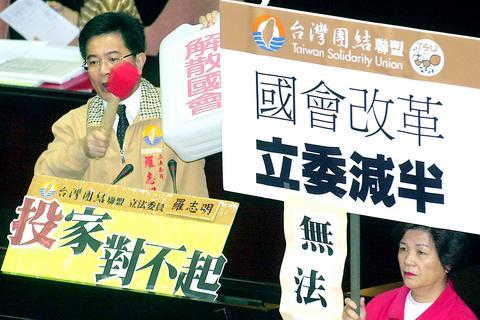Upset with what it sees as a watered-down Referendum Law (公民投票法), the Democratic Progressive Party (DPP) plans to request a constitutional interpretation of the law and to launch a referendum drive to have it vetoed.
The Cabinet was also considering rejecting the referendum law.

PHOTO: CHIEN JUNG-FENG, TAIPEI TIMES
The DPP legislative caucus lodged protests with Legislative Speaker Wang Jin-pyng (王金平) late Thursday night after the law was passed, accusing Chinese Nationalist Party (KMT) and People First Party (PFP) lawmakers of secretly replacing certain clauses of the bill during its third reading.
The DPP said the new law infringes on the Constitution, arguing that the Referendum Supervisory Committee, which would oversee the topics allowed for referendums, deprives people of the right to initiative referendums.
The DPP legislative caucus called the legislation process illegal and said it will file a constitutional interpretation of the legislation.
DPP caucus whip Ker Chien-ming (
DPP Legislator Chen Chun-hsin (陳忠信) said yesterday that provision 28 of the law was redundant as it stipulates that people can only ratify a constitutional amendment once 75 percent of legislators approved the bill and the bill was subsequently approved by a meeting of the National Assembly.
"Provision No. 2 of the law enables the people to vote in a referendum on a constitutional amendment, but provision No. 28 makes an additional requirement that the legislative body and an extraordinary National Assembly also approve it. It's redundant," Chen said.
"The pan-blue alliance admitted privately the awkwardness of the provisions, but was unwilling to make corrections to them," Chen said.
Responding to the DPP's accusation of a biased ruling on Thursday's reading of the law, Wang admitted yesterday there were flaws, but said the mistakes were corrected immediately.
In response to the Cabinet's proposal to override the Referendum Law, KMT caucus whip Lee Chia-chin (李嘉進) said yesterday that, given the dominance of pan-blue lawmakers, it would be easy for them to veto the Cabinet's proposal to reject the bill. The Cabinet's plan would be vetoed if half of the lawmakers disapprove of it.
In addition to requesting a constitutional interpretation, DPP headquarters yesterday proposed initiating a referendum drive to veto the law.
DPP Deputy Secretary-General Lee Ying-yuan (
Lee said if the Referendum Supervisory Committee approves such a referendum proposal, the referendum to toss out the referendum law could be held before the next presidential election, scheduled for March 20.
However, Lee said, if the referendum overseeing body set up to screen the topics allowed for a referendum rejects the proposal, the referendum could instead coincide with the Legislative Election at the end of next year.
"The opposition alliance passed a ridiculous referendum law. The DPP will not rule out all means possible to reject such a consequence," Lee said.
Also See Stories:
Referendum Law not a triumph for pan-blues: Ma
Yu lashes out at legislature over referendum law
China is `seriously concerned' about referendum law

FALSE DOCUMENTS? Actor William Liao said he was ‘voluntarily cooperating’ with police after a suspect was accused of helping to produce false medical certificates Police yesterday questioned at least six entertainers amid allegations of evasion of compulsory military service, with Lee Chuan (李銓), a member of boy band Choc7 (超克7), and actor Daniel Chen (陳大天) among those summoned. The New Taipei City District Prosecutors’ Office in January launched an investigation into a group that was allegedly helping men dodge compulsory military service using falsified medical documents. Actor Darren Wang (王大陸) has been accused of being one of the group’s clients. As the investigation expanded, investigators at New Taipei City’s Yonghe Precinct said that other entertainers commissioned the group to obtain false documents. The main suspect, a man surnamed

DEMOGRAPHICS: Robotics is the most promising answer to looming labor woes, the long-term care system and national contingency response, an official said Taiwan is to launch a five-year plan to boost the robotics industry in a bid to address labor shortages stemming from a declining and aging population, the Executive Yuan said yesterday. The government approved the initiative, dubbed the Smart Robotics Industry Promotion Plan, via executive order, senior officials told a post-Cabinet meeting news conference in Taipei. Taiwan’s population decline would strain the economy and the nation’s ability to care for vulnerable and elderly people, said Peter Hong (洪樂文), who heads the National Science and Technology Council’s (NSTC) Department of Engineering and Technologies. Projections show that the proportion of Taiwanese 65 or older would

Democracies must remain united in the face of a shifting geopolitical landscape, former president Tsai Ing-wen (蔡英文) told the Copenhagen Democracy Summit on Tuesday, while emphasizing the importance of Taiwan’s security to the world. “Taiwan’s security is essential to regional stability and to defending democratic values amid mounting authoritarianism,” Tsai said at the annual forum in the Danish capital. Noting a “new geopolitical landscape” in which global trade and security face “uncertainty and unpredictability,” Tsai said that democracies must remain united and be more committed to building up resilience together in the face of challenges. Resilience “allows us to absorb shocks, adapt under

Taiwan Semiconductor Manufacturing Co (TSMC, 台積電) yesterday said it is building nine new advanced wafer manufacturing and packaging factories this year, accelerating its expansion amid strong demand for high-performance computing (HPC) and artificial intelligence (AI) applications. The chipmaker built on average five factories per year from 2021 to last year and three from 2017 to 2020, TSMC vice president of advanced technology and mask engineering T.S. Chang (張宗生) said at the company’s annual technology symposium in Hsinchu City. “We are quickening our pace even faster in 2025. We plan to build nine new factories, including eight wafer fabrication plants and one advanced